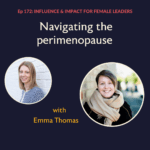Whilst some women sail through perimenopause, lots of us struggle with symptoms including brain fog, sleep issues, hot flushes and anxiety. Those symptoms can impede our ability to work, impact our confidence and cause an alarming number of women to leave their jobs.
I explore this with my guest Emma Thomas, founder of Managing the Menopause and host of the Middling Along podcast.
We discuss:
-
Why employers should care about supporting women through this transition
-
What managers can do to be supportive of colleagues struggling with perimenopause symptoms
-
How to talk to your line manager about your symptoms and what support you can request
-
Emma’s SENSE model for managing symptoms through lifestyle changes
-
Insights on how caffeine and alcohol impact your sleep
Emma is also teaching her SENSE model inside my Women Leading community at our bi-monthly menopause gatherings where we meet to share experiences and coping strategies.
My name’s Carla Miller, leadership coach, author and trainer. And this is the Influence & Impact podcast for women leaders, helping you confidently navigate the ups and downs of leadership and feel less alone on your journey as a leader. In fortnightly episodes I share practical tools and insights from myself and my brilliant guests that will help you succeed in your career.
FREE RESOURCE – How To Say No Challenge:
If you struggle to say ‘no’ then this free 5 day challenge is for you. You’ll receive a short email each day containing a short video taking you through the 5 steps of my How To Say No framework. We’ll get you happily saying no in just 5 days!
Join the next cohort of Influence & Impact to learn how to tackle self-doubt, increase your impact and become brilliant at influencing. It’s a small cohort working closely with me and includes 6 workshops and 2 peer coaching sessions.
My Be Bolder 4 week confidence and assertiveness course will be running again in February. In it we cover:
⭐ Tackling imposter feelings and self-doubt
⭐ Mastering your mindset
⭐ Courageous conversations
⭐ Speaking up
My Women Leading community gives you the support and strategies you need to:
⭐ Set boundaries and expectations
⭐ Prioritise your wellbeing
⭐ Coach your hybrid team effectively
⭐ Stop people pleasing
⭐ Lead under pressure
All for just £49/month
About Emma Thomas:
Emma is the founder of Managing the Menopause – her experience in coaching, internal communications and change management make her perfectly placed to help organizations plan and execute strategies to become more ‘menopause-friendly.’ Emma lives in Oxford with her husband and two children, and is also a Director of the Udjat CIC, which operates a wide-range of projects within Oxford and beyond.
